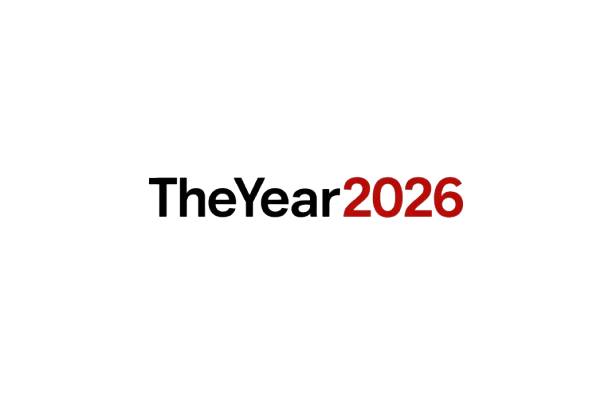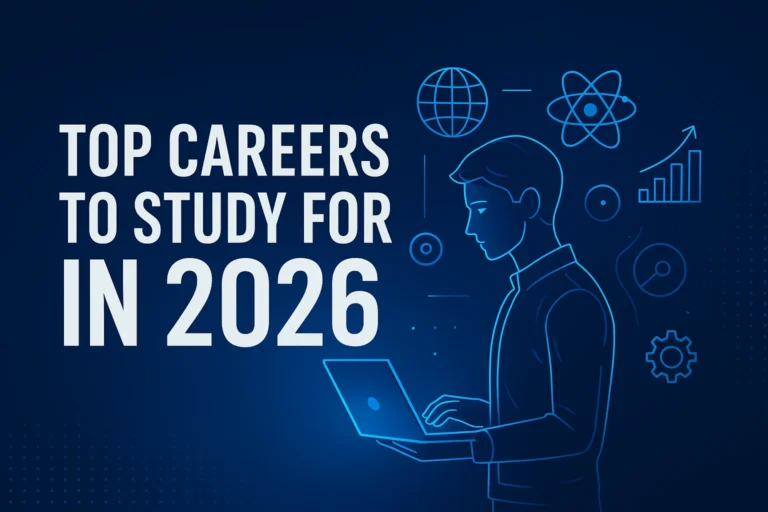Education has always been one of the strongest investments in a person’s future. But as technology reshapes industries, global markets shift, and new fields emerge, the definition of a “safe” career path evolves. Students planning their education in 2026 face a unique challenge: how do you choose a field of study that will remain relevant, profitable, and meaningful in a rapidly changing world?
This guide explores the top careers to study for in 2026, highlighting fields that combine long-term job security, strong earnings potential, and the opportunity to make a global impact.
1. Artificial Intelligence and Machine Learning
AI is no longer a buzzword, it’s the backbone of modern business. From healthcare to finance, companies are deploying AI solutions at scale, creating an unprecedented demand for specialists.
Why AI is a Top Career in 2026
- Global adoption: Every Tier 1 country (U.S., Canada, U.K., Australia, etc.) is investing heavily in AI research and application.
- High salaries: AI engineers already command six-figure incomes, and demand is outpacing supply.
- Ever-expanding use cases: Autonomous vehicles, personalized medicine, AI tutors, fraud detection, and climate modeling.
What to Study
- Computer Science with a focus on AI/ML
- Data Science
- Robotics and Cognitive Systems
- Ethics of AI (an emerging interdisciplinary field)
2. Renewable Energy and Sustainability
With climate change dominating global discourse, renewable energy careers are set to be some of the most future-proof.
Why Sustainability is Booming
- Governments are setting net-zero targets for 2030–2050.
- Massive funding for solar, wind, hydrogen, and carbon capture technologies.
- Businesses require sustainability consultants to meet ESG (Environmental, Social, and Governance) standards.
What to Study
- Environmental Engineering
- Renewable Energy Systems
- Climate Science and Policy
- Green Architecture and Sustainable Design
3. Cybersecurity
As the digital economy grows, so do cyber threats. By 2026, experts project a global shortage of 3.5 million cybersecurity professionals.
Why Cybersecurity is Critical
- Rising cyberattacks on infrastructure, healthcare, and government systems.
- Remote work culture expands vulnerabilities.
- AI-driven hacking is emerging, requiring AI-driven defenses.
What to Study
- Cybersecurity and Information Assurance
- Ethical Hacking
- Network Security
- Digital Forensics
4. Healthcare and Biotechnology
Healthcare is being reshaped by biotechnology, personalized medicine, and telehealth. The COVID-19 pandemic accelerated innovation in this space, and demand will keep rising.
Emerging Roles
- Genetic counselors
- Biomedical engineers
- Telehealth specialists
- Public health data analysts
What to Study
- Biotechnology
- Bioinformatics
- Public Health
- Nursing and Healthcare Administration
5. Data Science and Analytics
Every organization now runs on data. From sports to finance to entertainment, the ability to analyze, interpret, and act on data is invaluable.
Why Data is the “New Oil”
- Companies spend billions optimizing decisions with data.
- Predictive analytics drives business success.
- Cross-industry demand ensures career flexibility.
What to Study
- Data Analytics and Statistics
- Business Intelligence
- Applied Mathematics
- Data Engineering
6. Digital Marketing and Content Strategy
With more businesses moving online, the demand for digital marketers remains strong. But by 2026, the focus will shift toward AI-driven marketing strategies, SEO, and immersive media (VR/AR advertising).
What to Study
- Digital Marketing
- UX/UI Design
- Content Strategy and Brand Management
- Social Media Analytics
7. Finance and Blockchain Technology
The financial world is transforming, with blockchain, decentralized finance (DeFi), and fintech platforms gaining ground.
Why Finance Will Stay Strong
- Digital currencies are being adopted globally.
- Blockchain-based careers (auditors, developers, consultants) are expanding.
- Demand for financial analysts remains evergreen.
What to Study
- Finance and Economics
- Blockchain Development
- Accounting with Tech Integration
- Financial Engineering
8. Education and EdTech
Education itself is changing. Virtual classrooms, AI tutors, and digital learning platforms are disrupting traditional teaching.
Career Outlook
- Online course developers
- Educational technologists
- Curriculum designers
- STEM educators
What to Study
- Education with EdTech specialization
- Instructional Design
- Cognitive Science
- Learning Analytics
9. Law and Policy for Emerging Technologies
As new technologies emerge, governments struggle to regulate them. Lawyers and policymakers specializing in tech law, cybersecurity law, and environmental policy will be in high demand.
What to Study
- Law with focus on Technology and Cybersecurity
- International Policy
- Environmental Law
- Intellectual Property
10. Creative Industries and Design Thinking
Even in a digital-first world, creativity remains irreplaceable. Whether it’s digital art, UX design, or interactive storytelling, careers in creativity are thriving.
Why Creativity Matters in 2026
- Brands need original content to stand out.
- Gaming, AR, VR, and Metaverse industries are booming.
- Demand for immersive experiences across entertainment and education.
What to Study
- Digital Media Arts
- Game Design
- Human-Centered Design
- Animation and Film
Evergreen Skills That Apply Across Careers
Regardless of the path chosen, certain skills will define success in 2026:
- Critical thinking and adaptability
- Digital literacy (AI, cloud computing, data)
- Cross-cultural communication
- Entrepreneurship and innovation
Conclusion
The careers listed above represent not just trends, but long-term shifts in the global economy. Students entering these fields in 2026 will be preparing themselves for relevance well into 2030 and beyond.
The key is to balance personal passion with market demand. Whether you choose AI, healthcare, sustainability, or creative design, the opportunities for meaningful, well-paid work are stronger than ever.

